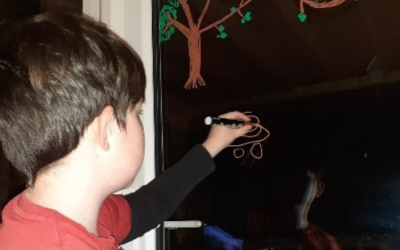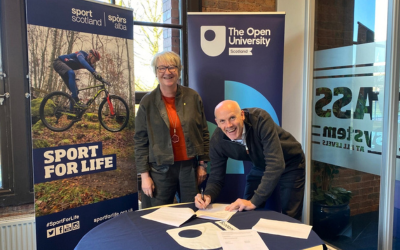Home education myths debunked
 Author:
Author:
Chelle Oldham is a Staff Tutor in the Open University’s Faculty of Wellbeing, Education & Language Studies.
Young people may be learning outside of formal schooling for many reasons. In this blog Chelle Oldham, a Staff Tutor in the Open University’s (OU) School of Education, Childhood, Youth and Sport, shares key findings from recent research shining a light on the voices of some of these young people, and how the OU can provide a way back into learning, from home.
It is estimated by The Centre for Social Justice that since the COVID pandemic lockdowns of 2020 and 2021, there has been a 30% increase in the number of young people being home educated in Scotland, bringing the figure up to 10,000.
In fact, the exact figure is likely to be higher, because home educated children and young people may not be known by local authorities or schools.
 The aim of my recent research was to listen to the voices of children and young people who are being home educated in Scotland and England.
The aim of my recent research was to listen to the voices of children and young people who are being home educated in Scotland and England.
The research considered what children, young people and adults within home education environments valued about education.
This inevitably led to families who participated discussing aspects of education that they felt were problematic.
Families were asked to choose images of their home education journey that represented the value they placed on education. Each family was encouraged to discuss the images they chose and share their reasons for wanting to include the image in the research.
The findings from the discussions both surprised me and reminded me that families are often left with limited choices when considering how to start their children’s educational journey.
You can do things with adults around you that you don’t really get to do – you can spend more time with them. Like with granny and grandad, I can spend a lot more, longer chunks of time than I would be able to in school.”
14-year-old research participant
What became clear was that the young people felt they should have a say in their educational journey and for the most part adults agreed.
The results of a questionnaire that I gave to families at the start of the research showed that adults gave significant value to children having choices when it came to the spaces in which they learn. Parents felt strongly that they neither wanted to replicate their own experience of education, nor did they choose to home educate their children for reasons of faith or religion.
Discussions also turned to what the young people were learning. One 16-year-old had already completed learning material available on the Open University’s free open educational resource site OpenLearn. This learning not only enabled this young person to access further education in Scotland, but it also enabled them to begin a programme of Higher Education at The Open University.
Indeed, Open University study is in tune with home education, as we are open to everyone, regardless of age, income, geography, and background.
Our OpenLearn site includes a home education collection and a collection of free courses to support school study. For most of our formal undergraduate courses, entry requirements are not required and the majority of our students in Scotland are eligible to study for free.
“You can’t really form a sibling relationship when you’re in school as much as you can when you’re in home education. Because in home ed, you’re with them, you spend time with them.”
15-year-old research participant
The most striking finding from listening to the voices of home educated young people was the desire to spend time with their siblings and learn from adults from whom they would otherwise have been separated.
Young people valued the unlimited access to both older and younger siblings, expressing the fact that had they been attending formal schooling, each young person would have been separated from their siblings for a lengthy part of each day.
Teenagers saw the value in learning from grandparents, parents and the adults from other home educating families.
Young people actively sought out their siblings to share learning experiences and assist each other when learning was tricky for them. Older siblings helped the adults explain the learning when younger siblings struggled.
Following the research, one family contacted me to share that they not only had a 17-year-old studying a formal Open University module, but that their younger sibling had started using OpenLearn to access learning materials.
Chelle Oldham is an Open University academic with over 15 years of experience in Early Years, Primary and Secondary Teaching, Technology Education and Education Policy.
More information about this research is available in an article on the OU’s free learning site OpenLearn. The site includes a hub for secondary school age students.
The OU also offers an undergraduate course which can be achieved through the study of free online modules.
Photo: Selected by a research participant as a reflection of their home education journey.
18 March 2024
News
Media contacts
Media enquiries
OU in Scotland Media Relations:
Call 0131 549 7932
OU UK Press Office:
Call 01908 654316
Out-of-hours:
07901 515 891
Visit our OU UK news site

